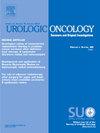Developing biomarkers and methods of risk stratification: Consensus statements from the International Kidney Cancer Symposium North America 2024 Think Tank
IF 2.3
3区 医学
Q3 ONCOLOGY
Urologic Oncology-seminars and Original Investigations
Pub Date : 2025-08-16
DOI:10.1016/j.urolonc.2025.07.020
引用次数: 0
Abstract
Accurate prognostication and personalized treatment selection remain major challenges in kidney cancer. This consensus initiative aimed to provide actionable expert guidance on the development and clinical integration of prognostic and predictive biomarkers and risk stratification tools to improve patient care and guide future research. A modified Delphi method was employed to develop consensus statements among a multidisciplinary panel of experts in urologic oncology, medical oncology, radiation oncology, pathology, molecular biology, radiology, outcomes research, biostatistics, industry, and patient advocacy. Over 3 rounds, including an in-person meeting 20 initial statements were evaluated, refined, and voted on. Consensus was defined a priori as a median Likert score ≥8. Nineteen final consensus statements were endorsed. These span key domains including biomarker prioritization (favoring prognostic biomarkers), rigorous methodology for subgroup and predictive analyses, the development of multi-institutional prospective registries, incorporation of biomarkers in trial design, and improvements in data/biospecimen access. The panel also identified high-priority biomarker types (e.g., AI-based image analysis, ctDNA) for future research. This is the first consensus statement specifically focused on biomarker and risk model development for kidney cancer using a structured Delphi process. The recommendations emphasize the need for rigorous methodology, collaborative infrastructure, prospective data collection, and focus on clinically translatable biomarkers. The resulting framework is intended to guide researchers, cooperative groups, and stakeholders in advancing personalized care for patients with kidney cancer.
发展生物标志物和风险分层方法:来自2024年北美国际肾癌研讨会的共识声明
准确的预后和个性化的治疗选择仍然是肾癌治疗的主要挑战。这一共识倡议旨在为预后和预测性生物标志物和风险分层工具的开发和临床整合提供可操作的专家指导,以改善患者护理并指导未来的研究。采用改进的德尔菲法,在泌尿肿瘤学、内科肿瘤学、放射肿瘤学、病理学、分子生物学、放射学、结局研究、生物统计学、工业和患者倡导等多学科专家小组中形成共识声明。在包括面对面会议在内的三轮会议中,对20份初步声明进行了评估、修改和投票。共识被先验地定义为中位李克特评分≥8。19项最后协商一致声明获得核可。这些跨越关键领域,包括生物标志物优先排序(倾向于预后生物标志物),亚组和预测分析的严格方法,多机构前瞻性注册的发展,在试验设计中纳入生物标志物,以及数据/生物标本获取的改进。该小组还确定了未来研究的高优先级生物标志物类型(例如,基于人工智能的图像分析,ctDNA)。这是第一个使用结构化德尔菲过程专门关注肾癌生物标志物和风险模型开发的共识声明。这些建议强调需要严格的方法、协作基础设施、前瞻性数据收集,并关注临床可翻译的生物标志物。由此产生的框架旨在指导研究人员、合作团体和利益相关者推进肾癌患者的个性化护理。
本文章由计算机程序翻译,如有差异,请以英文原文为准。
求助全文
约1分钟内获得全文
求助全文
来源期刊
CiteScore
4.80
自引率
3.70%
发文量
297
审稿时长
7.6 weeks
期刊介绍:
Urologic Oncology: Seminars and Original Investigations is the official journal of the Society of Urologic Oncology. The journal publishes practical, timely, and relevant clinical and basic science research articles which address any aspect of urologic oncology. Each issue comprises original research, news and topics, survey articles providing short commentaries on other important articles in the urologic oncology literature, and reviews including an in-depth Seminar examining a specific clinical dilemma. The journal periodically publishes supplement issues devoted to areas of current interest to the urologic oncology community. Articles published are of interest to researchers and the clinicians involved in the practice of urologic oncology including urologists, oncologists, and radiologists.

 求助内容:
求助内容: 应助结果提醒方式:
应助结果提醒方式:


